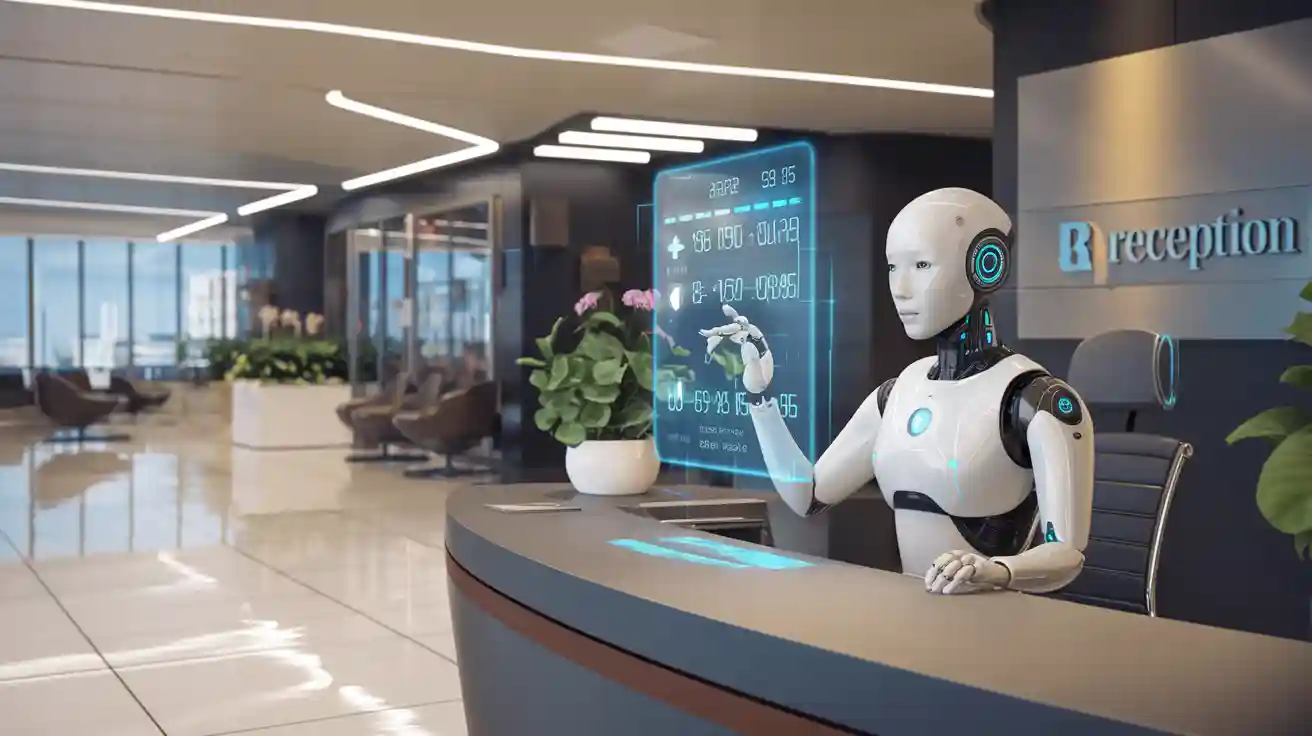How AI Agents Are Taking Receptionist Jobs Today

You may have noticed how businesses are turning to AI to handle receptionist duties. AI agents taking receptionist jobs is becoming a common trend. These systems can manage large volumes of customer interactions without losing service quality. They also automate tasks like answering common questions and scheduling appointments. This reduces the workload on human staff and improves efficiency. For businesses, this shift means cost savings and faster customer service. As AI continues to evolve, its role in workplaces grows, leaving you to wonder how it impacts human receptionists.
Key Takeaways
AI receptionists handle calls and schedule appointments. This saves time and reduces work for people.
Companies can cut 50-70% of labor costs by using AI. The saved money can be used for other needs.
AI works all day and night, answering questions anytime. This makes customers happier.
AI is fast but cannot understand feelings like humans. So, it’s important to mix AI with human help.
Learning to manage AI can help receptionists get better jobs. They can move into roles needing human decision-making.
What AI Receptionists Do
Core Tasks of AI Receptionists
Call Handling and Routing
AI receptionists excel at managing calls efficiently. They greet callers, answer incoming calls, and provide basic information about your business. These systems can also route calls to the appropriate department or individual, ensuring smooth communication. By automating this process, businesses can handle high volumes of calls without delays. This improves customer satisfaction and reduces the workload on human staff.
Appointment Scheduling
Scheduling appointments is another key task for AI receptionists. They can book meetings, manage calendars, and send reminders to both customers and employees. This automation ensures that appointments are organized and reduces the chances of double bookings. For businesses, this means fewer scheduling errors and more streamlined operations.
Answering FAQs
AI receptionists are often used to answer frequently asked questions. They can provide quick responses to inquiries about your services, pricing, or operating hours. This capability helps you automate customer interactions, saving time for both your staff and customers. Additionally, AI systems can collect information from callers, such as contact details, which can be used for follow-ups or marketing purposes.
AI receptionists offer a scalable and flexible solution for businesses looking to improve customer service and operational efficiency.
Technologies Behind AI Receptionists
Natural Language Processing
Natural Language Processing (NLP) enables AI receptionists to understand and interpret human language. This technology allows them to engage in meaningful conversations with customers. Techniques like text parsing and sentiment analysis help AI systems comprehend inquiries effectively. As a result, AI-powered customer interactions feel more natural and human-like.
Chatbots and Virtual Assistants
Chatbots and virtual assistants form the backbone of many AI receptionist systems. These tools are designed to handle customer interactions across multiple channels, including phone calls, emails, and live chats. Their ability to respond quickly and accurately ensures a seamless experience for your customers.
Machine Learning and Voice Recognition
Machine learning allows AI receptionists to learn from past interactions. Over time, they improve their responses and personalize customer experiences. Voice recognition technology further enhances their capabilities by enabling them to understand different accents and speech patterns. This combination ensures that AI systems can handle diverse customer needs effectively.
Benefits of AI Receptionists

Cost Efficiency
Reduced Labor Costs
AI receptionists significantly lower labor expenses for businesses. Unlike human receptionists, AI systems do not require salaries, benefits, or paid time off. Businesses using AI receptionists can save between 50-70% on labor costs, reallocating these funds to areas like marketing or product development. While a human receptionist may cost over $50,000 annually, AI solutions start as low as $3,000 to $5,000 per year. These savings make AI a cost-effective choice for companies aiming to optimize their budgets.
Lower Overhead Expenses
AI systems also reduce overhead costs. They eliminate the need for physical office space, equipment, and utilities typically required for human receptionists. Additionally, AI receptionists require minimal training and setup, further cutting expenses. Over time, businesses report up to 40% annual cost reductions, making AI a long-term investment that pays off.
24/7 Availability
Always-On Customer Support
AI receptionists provide round-the-clock customer support, ensuring no call or inquiry goes unanswered. In today’s fast-paced world, customers expect businesses to be available at all times. This constant availability enhances customer satisfaction and loyalty. For industries like healthcare and tech repair, where missing a call could mean losing a client, AI ensures every interaction is captured.
Handling After-Hours Inquiries
AI receptionists excel at managing after-hours inquiries. They handle customer interactions during nights, weekends, and holidays, offering uninterrupted service. This capability not only improves the customer experience but also increases engagement and sales opportunities. Businesses like e-commerce platforms have reported processing 50% more customer inquiries during peak times, such as Black Friday, thanks to AI systems.
Enhanced Efficiency
Faster Response Times
AI receptionists respond to inquiries faster than human receptionists. They are designed to handle multiple tasks simultaneously, ensuring customers receive timely assistance. This reduces long wait times and improves the overall customer experience. Clients often appreciate the speed and efficiency of AI, especially during off-hours.
Reduced Human Errors
AI systems minimize errors in tasks like appointment scheduling and call routing. Unlike humans, AI does not get tired or distracted, ensuring consistent accuracy. For example, healthcare providers have seen a 25% reduction in appointment no-shows due to automated scheduling. This reliability contributes to a high-quality customer experience and smoother operations.
Businesses across industries, from retail to real estate, report significant benefits after implementing AI receptionists. These systems not only save costs but also enhance customer satisfaction and operational efficiency.
Challenges and Limitations of AI Receptionists
Lack of Human Touch
Handling Emotional Interactions
AI receptionists struggle with emotional interactions. While they can mimic empathy, they lack genuine emotional understanding. This often leads to inappropriate responses in complex situations. For example, frustrated customers or those dealing with sensitive issues may feel unheard. Human receptionists excel in these scenarios because they interpret tone and respond with true empathy. You may find that AI systems fail to provide the same level of care, which can negatively impact customer satisfaction.
Building Customer Rapport
Building rapport requires a personal touch that AI cannot replicate. Customers often feel that AI lacks the warmth and understanding of a human receptionist. Common complaints include:
AI cannot replicate the empathy and understanding that humans provide.
Misinterpretation of tone or context leads to misunderstandings.
Unwavering positivity can make customers feel their concerns are not taken seriously.
These limitations highlight the importance of balancing AI with human interaction to maintain strong customer relationships.
Technical Issues
System Downtime
AI systems require regular updates and maintenance to function optimally. Downtime during updates or technical failures can disrupt operations. Businesses often face challenges when AI receptionists fail to handle complex queries, leaving customers frustrated.
Issue Type | Description |
|---|---|
Technical Limitations | AI struggles with nuanced conversations and complex scenarios. |
Maintenance Requirements | Regular updates are resource-intensive but necessary for smooth functioning. |
Language and Accent Misunderstandings
Accents and speech patterns vary widely, even within the same language. AI receptionists often fail to recognize certain accents, requiring human intervention. Customers may feel more comfortable when the AI speaks in an accent similar to their own. Mismatched accents can lead to misunderstandings, causing frustration and highlighting the need for better AI design.
Customer Resistance
Preference for Human Interaction
Many customers prefer interacting with humans over machines. AI receptionists excel at simple tasks but often fail to address complex needs. This makes customers feel like they are speaking to a machine rather than someone who understands their concerns.
Frustration with Automation
Automation can lead to frustration when AI misinterprets customer statements or struggles with complex requests. Customers often expect emotional intelligence in sensitive conversations, which AI cannot provide. Businesses can address this by gradually introducing AI for simpler tasks like FAQs or appointment scheduling, building customer confidence over time.
Impact on Human Receptionists
Job Displacement
Reduced Demand for Traditional Roles
The rise of AI agents taking receptionist jobs has reduced the demand for traditional receptionist roles. AI systems handle routine tasks like call routing and appointment scheduling, leaving fewer opportunities for human receptionists. This shift has led to concerns about job security among employees. Many businesses now rely on AI receptionists to manage customer interactions, which impacts the availability of entry-level administrative positions.
Economic and Emotional Impact
Losing a job to AI can have significant economic and emotional consequences. You may experience stress and anxiety about your future career prospects. The absence of human interaction in workplaces dominated by AI can also lead to feelings of loneliness and reduced team morale. Human receptionists bring emotional intelligence to their roles, which AI cannot replicate. They excel at building rapport and handling sensitive situations, making their contributions invaluable despite the growing reliance on AI.
Upskilling Opportunities
Transitioning to Advanced Roles
While AI replaces some tasks, it also creates opportunities for you to transition into advanced roles. Learning to manage AI systems can position you for new career paths. For example, you could focus on troubleshooting AI issues or leveraging its capabilities to enhance customer service. These roles require advanced software skills and the ability to work alongside AI, making them ideal for those willing to adapt.
Training in AI Management
Training programs can help you develop the skills needed to thrive in an AI-driven workplace. These programs teach you how to manage and collaborate with AI systems effectively. By understanding new technologies, you can build confidence in your role and take on complex tasks that require human judgment. Upskilling ensures you remain relevant in a rapidly evolving job market.
Evolving Workplace Roles
Focus on Emotional Intelligence
As AI systems handle routine tasks, your role can shift toward responsibilities that require emotional intelligence. Empathy and creative problem-solving are essential for navigating complex customer interactions. For example, you can use emotional cues to resolve conflicts or address customer concerns before they escalate. These skills complement AI capabilities and ensure a balanced approach to customer service.
Collaboration with AI Systems
Successful workplaces integrate human and AI strengths. AI systems can manage repetitive tasks, allowing you to focus on nuanced responsibilities. For instance, AI receptionists can handle appointment scheduling while you address more complex customer needs. This collaboration improves efficiency and enhances the overall customer experience. By working alongside AI, you can contribute to a more dynamic and effective workplace.
AI receptionists are reshaping the workplace by offering cost savings, operational efficiency, and 24/7 availability. Their ability to handle multiple inquiries simultaneously and reduce overhead costs makes them a valuable asset for businesses.
However, challenges like the lack of personal touch and difficulty managing complex interactions remain significant. Customers often find AI interactions impersonal, which can lead to dissatisfaction.
To ensure smooth integration, businesses should:
Assess current systems and choose compatible AI solutions.
Train staff and AI systems to handle tasks effectively.
Monitor performance and collect feedback for continuous improvement.
Advancements in Natural Language Processing will further enhance AI capabilities, making interactions more natural and customer-friendly.
By embracing upskilling and fostering collaboration between humans and AI, you can create a balanced and efficient workplace that meets modern demands.
FAQ
What industries benefit the most from AI receptionists?
AI receptionists are widely used in industries like healthcare, retail, real estate, and hospitality. These sectors rely on high volumes of customer interactions. AI systems streamline tasks like appointment scheduling and answering FAQs, making them ideal for businesses that prioritize efficiency and customer service.
Can AI receptionists handle multiple languages?
Yes, many AI receptionists support multiple languages. They use advanced Natural Language Processing (NLP) to understand and respond in different languages. However, their accuracy may vary depending on the language's complexity and the system's training data.
How secure is customer data with AI receptionists?
AI receptionists prioritize data security by using encryption and secure servers. Reputable providers comply with regulations like GDPR or HIPAA. You should always verify the security measures of the AI system you choose to ensure customer data remains protected.
Do AI receptionists require regular updates?
Yes, regular updates are essential for optimal performance. Updates improve features like voice recognition and bug fixes. They also enhance the system's ability to handle new customer queries. Without updates, the AI may become less effective over time.
How can businesses balance AI and human receptionists?
Businesses can assign routine tasks like call routing to AI while reserving complex or emotional interactions for human receptionists. This approach ensures efficiency without losing the personal touch. Collaboration between AI and humans creates a balanced and customer-friendly experience.
See Also
The Impact of AI Agents on Receptionist Employment Today
AI Call Agents Transforming the Customer Service Landscape
Comprehensive Overview of AI Voice Receptionist Prompts for 2025
Leveraging AI Voice Receptionists for Business Growth Strategies

